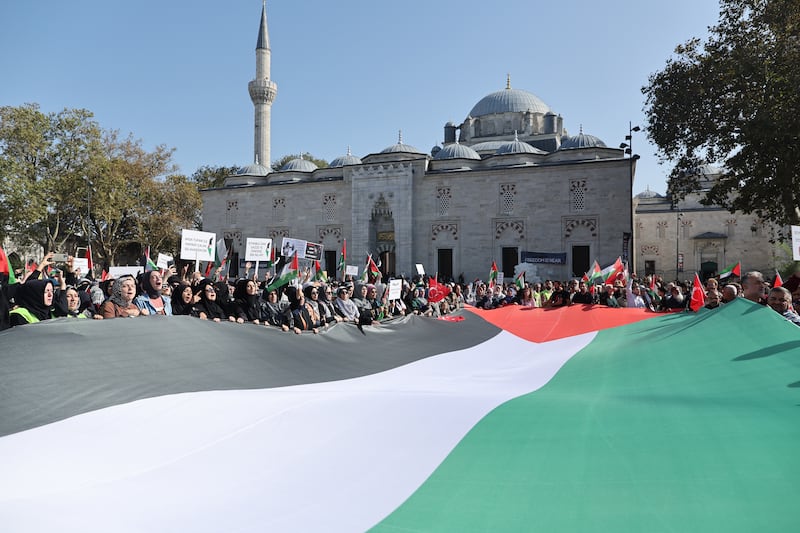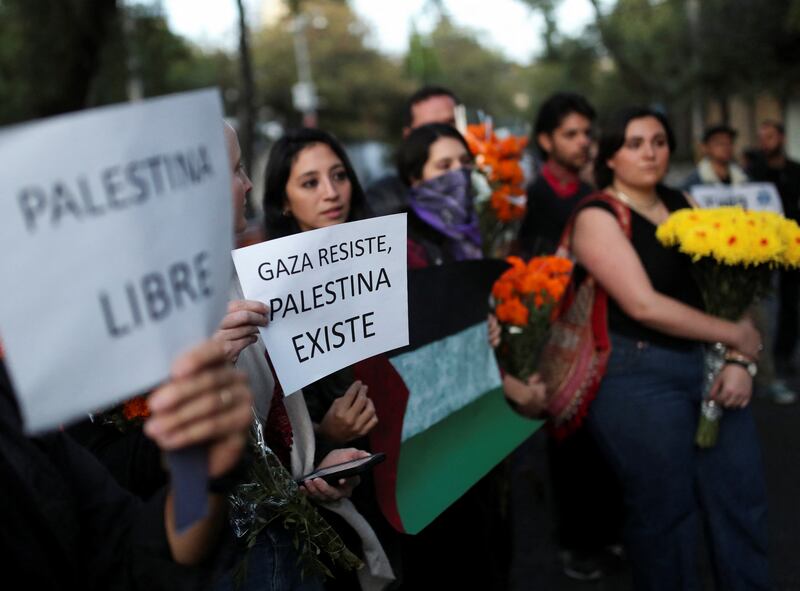The Republic of Turkey turns 100 years old this weekend, yet the flood of support for Palestinians might make it hard to recall the extent to which the state led by Mustafa Kemal Ataturk, the country’s founder, embraced secularism and western ideals.
President Recep Tayyip Erdogan has been talking up the centennial for years, promising a Turkish Century in which the country flexes its growing might to defend Muslims and take its rightful place as a major power.
On some counts, Ankara may be seen as having fallen short. Turkey has struggled for years with high inflation and currency devaluation, and gross domestic product has expanded only about half as much as the governing Justice and Development Party (AKP) envisioned a dozen years ago.
Yet the rise of the defence sector – set to record about $7 billion in exports this year – highlights progress of which Ataturk, Turkey’s greatest military leader, would be proud. Early in the First World War, he made his mark in Gallipoli, pushing Allied troops led by Winston Churchill into the sea.
Four years later, he rallied Turkish forces at their darkest moment and famously drove the Greek army into the Mediterranean, carving out today’s Turkey. Add centuries of Ottoman conquest and it’s no surprise that Turks have been endowed with a warrior mindset.

A decade after Ataturk founded the Republic, his government mandated that all citizens, many of whom used just one name, choose a patronym. Many choices reflected a martial spirit: “Erdogan” means “natural-born soldier”; “Yilmaz” is “brave, undaunted”; “Bayraktar” is “standard bearer”; and so on.
As the centennial has approached, the AKP has sought to celebrate this martial tradition. At the weekend, the government said next year’s defence budget would be 2.5 times that of this year, leaping from $16 billion to $40 billion. The AKP uses most new defence accomplishments to evoke historical successes like the 11th-century Battle of Manzikert. Mr Erdogan views that victory by the Seljuk Empire, an Ottoman pre-cursor, as Turks’ first great humbling of western Crusader imperialists, proving the superiority of warriors fighting for faith.
Such assertions of Muslim pride mark a departure from Ataturk’s vision of a West-leaning state. “The Kemalist reforms began to make this secularist dream a reality,” San Diego State University professor Ahmet Kuru writes in the new, 700-page book titled A Companion to Modern Turkey’s Centennial. “But it meant a nightmare for not only Islamists but also most Islamic conservatives.”
For Turkey’s first six decades, secularists ran the country and conservatives were the marginalised other. The resulting backlash ultimately led to Mr Erdogan’s two decades in power, which have upended this socio-political dichotomy. In today’s Turkey, Islamic voices are given priority, while West-leaning progressives are often sidelined.
In some ways, Ataturk’s legacy remains robust. Turks still pause for a minute every November 11 to mark his passing and their commitment to democracy is rock-solid. The Open Society Foundations’ Democracy Barometer surveyed 30 countries and found that few countries appreciate democracy more. More than 19 out of 20 Turkish citizens (96 per cent) confirmed its importance, tying with Ethiopia for the top spot. Compare this with 82 per cent of UK citizens and just 80 per cent of Americans.
In other ways, it’s almost as if the Kemalist era never happened. The Turkish state and its backers have returned to supposed Ottoman ideals, and of late that means defending Palestinians with a “saglam irade”, or iron will.
Decades ago, few Turks could name the country’s top imam, the head of the Diyanet. Today, Ali Erbas is a minor celebrity with more than half a million followers on X. “Take a lesson from history,” he urged in his Friday sermon at Hagia Sophia, brandishing a sword. “The one who is rendered prosperous by oppression will end up in perdition.”
Mr Erdogan said Israel’s attacks on Gaza “amounted to genocide”. His son-in-law and potential successor, Selcuk Bayraktar, also invoked the “G” word, described Israel’s response as “one of the worst tragedies in history” and donated $10 million for Gaza aid.
Pro-Palestinian views run across the political spectrum, with some going to the extreme. Islamist groups have held rallies at which they chanted pro-Hamas slogans and called for Turkish troops in Gaza. Meral Aksener, head of the opposition far-right IYI Party, said Israeli Prime Minister Benjamin Netanyahu is the “21st century’s Hitler”.
These views are making an impact. Following Ankara’s improvement of ties with Gulf allies and Egypt, relations with Israel had also been on the mend in recent months. But Turkey’s increasingly pro-Palestinian stance is undoing that progress. After protests in major Turkish cities and fireworks shot at the Israeli embassy, Israel last week recalled all diplomats from Turkey and urged citizens to leave as well, citing security concerns.
My previous column detailed how the US and Israel would pressure Ankara to cut ties with Hamas, and that push began with US sanctions against Hamas’s financial network. Turkey repeatedly offered to mediate the release of hostages in Gaza, even as Turkish officials – according to one report – asked some Hamas leaders to leave the country. But it was Qatar that played the key role in securing the release of an American-Israeli mother and daughter at the weekend.
In the weeks to come, strong domestic backing for Palestinians is likely to put Nato member-state Turkey between a rock and a hard place – particularly if Israel, as expected, launches a Gaza ground invasion that worsens the humanitarian situation. On Monday, Mr Erdogan submitted Sweden’s Nato bid approval to Turkey’s parliament, perhaps aiming to offer an olive branch to the US and EU.
Yet at the same time, American and European capitals have seen increasing pushback against unquestioned support for Israel. A top US State Department official resigned last week in protest at continued arms sales to Israel. Days later, Secretary of State Antony Blinken met Muslim and Arab-American staffers to hear their views on Israel’s bombing campaign, which as of Monday had killed about 5,000 people.
US officials have in recent days stressed the need to minimise Palestinian casualties. Similarly, more than 800 EU diplomats and officials sent a letter to European Commission President Ursula von der Leyen arguing that continued support for Israel could lead to Gaza and its population getting “erased from the planet”.
Criticism of Israel is no longer a fringe idea in the West, as it was around the time of 9/11. Washington and Brussels would surely prefer a more Kemalist Turkey right now, but today’s changing political winds hint at a poetic recalibration.
A century ago, the Ottoman state shed Islamic rule and looked westward to become Turkey. Now, to understand and respond to one of the greatest global crises in decades, the West seems to grasp that it will need to take a few cues from Turkey and the Muslim world.
















